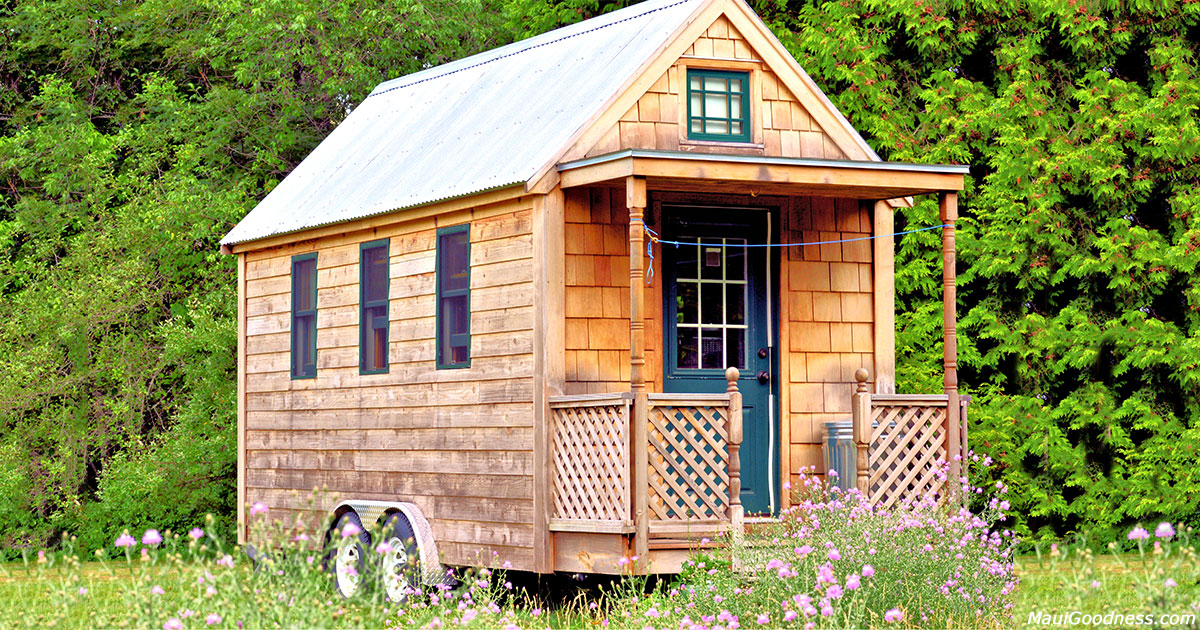
By: Erik Blair
Tiny Houses have grown in popularity due to the rising cost of living and the movement to smaller, more efficient and low-impact lifestyles. The financial benefits of living in a Tiny House are plentiful which makes them ideal for those looking to escape the rat race. And now Hawaii is ready to ride the wave as the best place to legally live in a Tiny House.
What is a Tiny House?
Simply put, a tiny house is a dwelling that is smaller than a traditional house. Typically a Tiny House has about 110 to 190 square feet of living space, often includes a sleeping loft and is regularly mounted on a wheeled trailer. Although Tiny Houses are built with the same quality and strength as standard houses, they generally do not meet the minimum square feet requirements of building codes in most states.
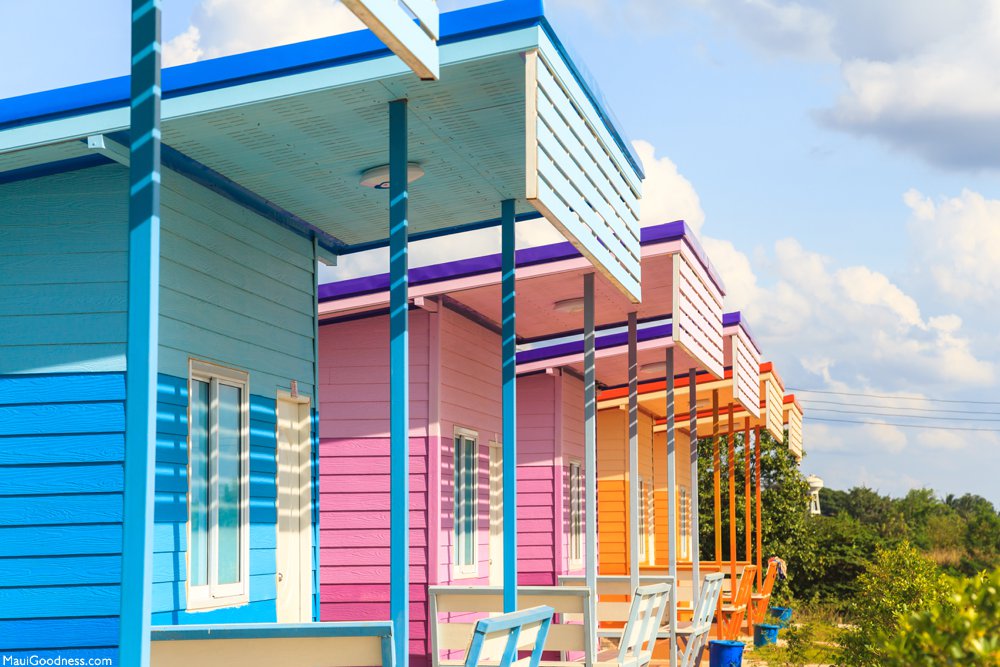
Are they legal in Hawaii?
Digging into the legality of Tiny Houses required speaking with several local government agencies including the Maui public works department who merely pointed to laws that require minimum floor plan dimensions that are much larger than the average Tiny House. But Tiny Houses are built on wheeled trailers, and are more like recreational vehicles. The building plans examiner said that they would have no jurisdiction over someone living in a recreational vehicle; that the DMV would have jurisdiction because it would be registered with them.
According to the Maui DMV Operations Supervisor a custom built travel trailer would be classified as a “trailer.” This was a welcome point of clarification mainly because a Tiny House does not meet the International Building Code (IBC) for traditional house construction, and Tiny Houses are built to a much higher standard then ordinary RV’s. So with the help of a legal researcher I was able to find Hawaii Statewide Traffic Code §291C.
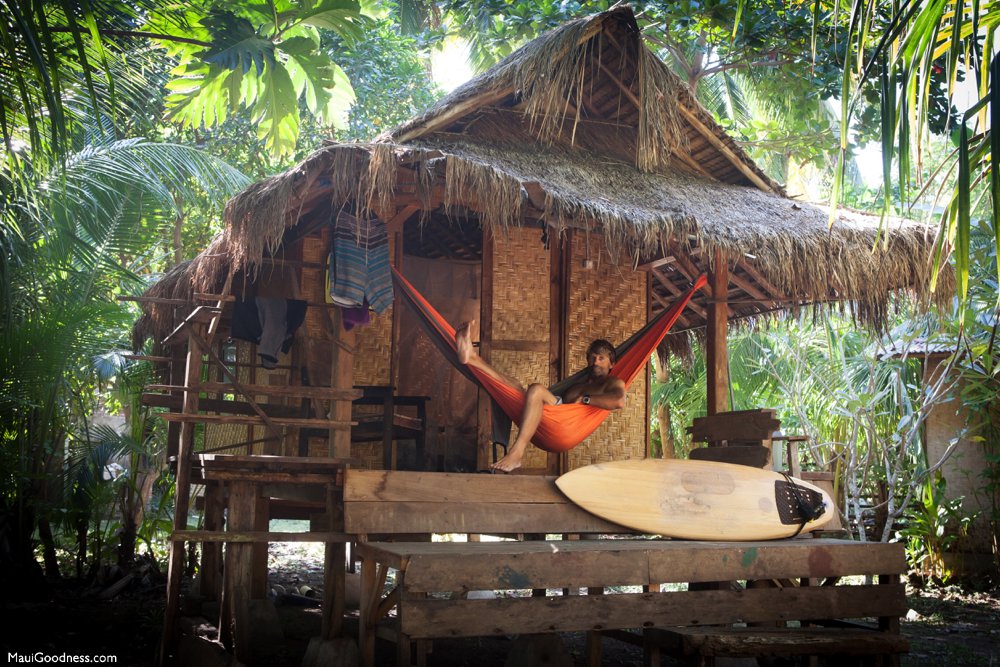
This section defines Tiny Houses as “House Trailers” in Hawaii:
§291C-1 Definitions.
“House trailer” means:
(1) A trailer or semitrailer which is designed, constructed, and equipped as a dwelling place, living abode, or sleeping place (either permanently or temporarily) and is equipped for use as a conveyance on streets and highways
This section provides that House Trailers can be used as “dwellings” on private property:
§291C-112 Certain uses of parked vehicles prohibited between 6:00 p.m. and 6:00 a.m.; definition; exceptions. (a) No person shall use any vehicle for purposes of human habitation, whether or not the vehicle is designed or equipped for that purpose, while the vehicle is parked on any roadway, street, or highway or other public property between the hours of 6:00 p.m. and 6:00 a.m. or while the vehicle is parked on private property without authorization of the owner or occupant authorizing both the parking of the vehicle there and its use for purposes of human habitation.
(b) As used in this section “purposes of human habitation” includes use as a dwelling place, living abode, or sleeping place.
(c) This section does not apply to the parking of vehicles and their use for purposes of human habitation in parks, camps, and other recreational areas in compliance with law and applicable rules and regulations, or under emergency conditions in the interest of vehicular safety.
In Hawaii, Tiny Houses are officially called, “House Trailers”
In summary, House Trailers are legal in Hawaii. It’s legal to live in them on private property without a permit. To meet the requirements of 291C-1 (definitions) and 291C-112 you must have a legal House Trailer that is registered and licensed by the Hawaii DMV, and you must park it on private property that you own or with permission of the land owner. It is as simple as that.
Hawaii has ideal weather for Tiny House living, small-scale farming and generally enjoying the great outdoors. Because Tiny Houses have a low-impact on the environment they are decidedly more appealing than more large-scale development here in Hawaii.
Some local municipalities around the country have been resisting Tiny Houses for fear of producing a low-cost alternative to buying real property or renting from landlords. In comes the Tiny House movement to save the day for thrifty folks who don’t mind smaller spaces. In the last 5 years Tiny Houses have grown in popularity everywhere on the mainland, and especially on social media. They’re popping up just about everywhere they are legally allowed.
Furthermore, zoning requirements of traditional houses do not apply. In Hawaii, you can start an EcoVillage, a Tiny House Village if you will, by clustering several Tiny Houses in close proximity to each other. You don’t even need to buy the land. Depending on your situation and ability to work out a deal, you can build a house and negotiate a place to put it for far less than buying or renting.
See Hawaii Statewide Traffic Code §291C:
https://www.capitol.hawaii.gov/hrscurrent/Vol05_Ch0261-0319/HRS0291C/HRS_0291C-0001.htm
https://www.capitol.hawaii.gov/hrscurrent/Vol05_Ch0261-0319/HRS0291C/HRS_0291C-0112.htm
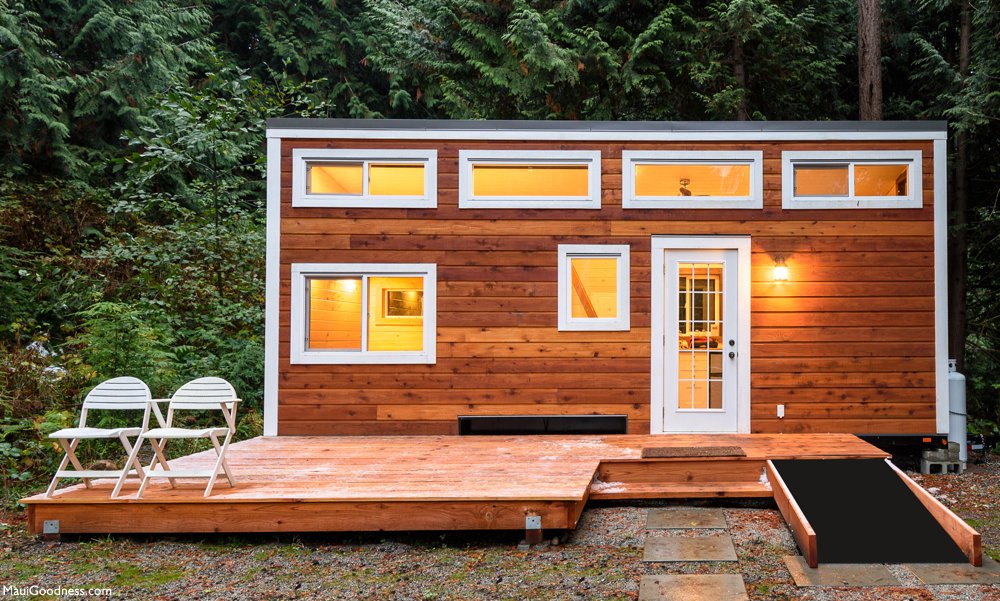
July 11, 2014 UPDATE –
There always seems to be some obstacle to innovation in Hawaii. Here’s a good example that was sent in from a fan.
This update pertains ONLY to Hawaii County (Island of Hawaii Only):
Hawaii County Code Section 25-4-10. Mobile dwellings.
All mobile dwellings shall conform to the County building code (chapter 5 of this Code), and the Public Health Housing Code (chapter 2 of the State public health regulations), except:
(1) When parked in a licensed mobile home park; or
(2) When occupied for dwelling or sleeping purposes outside of a licensed mobile home park for less than thirty days in any one location.
(1996, Ord. No. 96-160, sec. 2; ratified April 6, 1999.)25-4-10
Possible solutions to consider:
1. Change that law.
2. How can the county prove that the dwelling was occupied for more than 30 days consecutively? Just stay in a hotel for 1 night every 29 days.
3. If you move the house 10 feet every 30 days, then you can live in it forever.
4. Get a Mobile Home Park permit for your property.
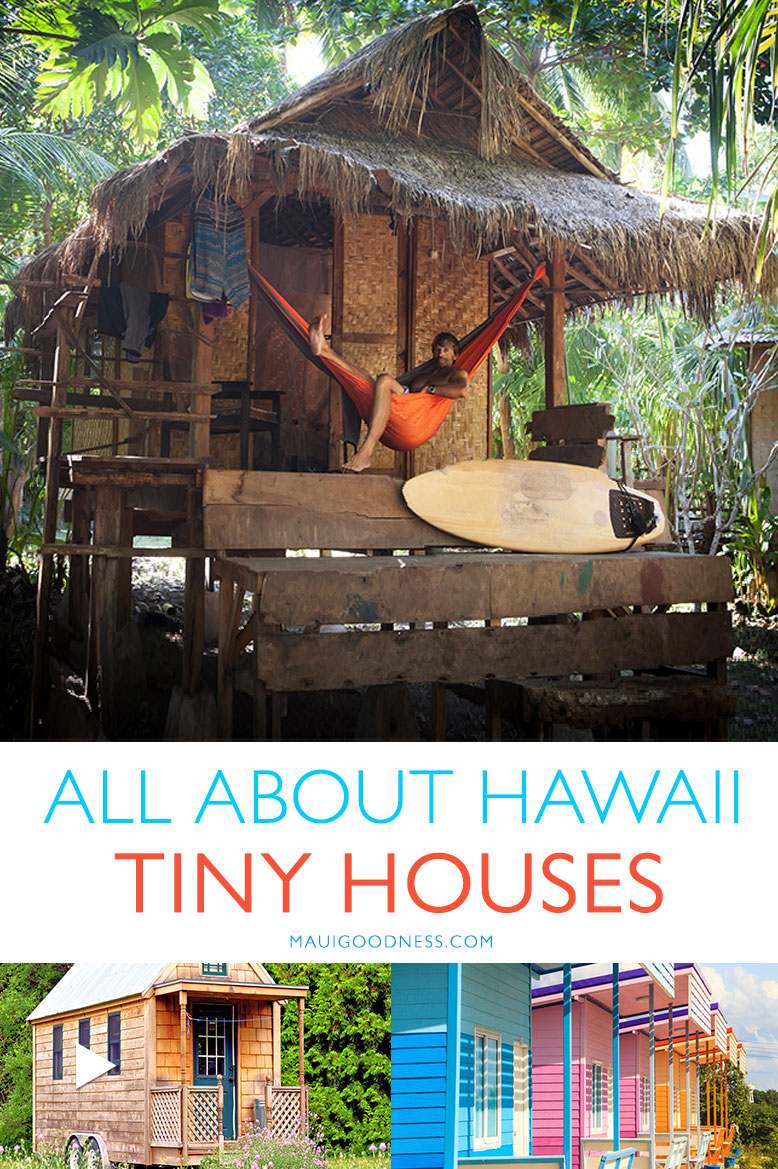

[…] See update article here — https://www.mauigoodness.com/2014/04/08/hawaii-the-perfect-place-for-tiny-houses/ […]
This is a pretty good idea. The only problem I see is the same reason RVs are not viable, and that’s a lack of place to dump waste. All that grey and black water’s gotta go somewhere.
Aloha Adrien,
1) RV’s and mobile homes and built differently than Tiny Houses. The construction of a tiny house uses the same quality and strength of traditional homes, not the flimsy, wafer-thin tin construction of mobile homes nor the slapped together construction of RV’s. Tiny houses are bolted down to a legal trailer, and the framework is stronger than a frame-built house.
2) Waste is handled (or not handled) differently depending on several factors. In many cases the liquid is processed separately from the solid waste, thus it is less a problem. There are different methods to take care of all the different scenarios people want to avoid. One thing is for sure, it’s safer and easier to manage than Kihei’s waste water and treatment problems. One reason is that waste isn’t “dumped” into the ocean nor is it fermenting in a pit. The grey water can also be processed:
https://thetinylife.com/greywater-systems/ <– link to grey water ideas
https://www.tinyhousedesign.com/how-to-move-yourself-off-the-grid/ <– link to waste processing ideas
I enjoyed the article about tiny houses on island. I think it would fit my lifestyle of moving from place to place to support my clients. It also feels good to reduce your carbon footprint. Thanks for sharing…
Aloha Amy,
I agree! The lower carbon footprint and freedom to move about the world is rewarding both professionally and spiritually. Enjoy!
Before moving to Maui, my husband and I spent 5 months zig zagging across the county. All the time living out of our ’94 Escort wagon. These “House Trailers” look gloriously spacious compared to that trip. Great post, Erik.
Sounds like a fun trip Danielle! The current Tiny House design I am working on is about 8.5 feet wide, by 24 feet long, by 13 feet tall (to include a loft and storage). That’s about 4-1994 Ford Escort Wagons stacked and gutted 🙂
Aloha and Mahalo for your comment!!!
So, where can I find a tiny house on Maui? Or, how much would it cost to build one on site? I own 1/3 acre in Kihei on a beach road, which has a house & ohana cottage on it, but has 1/3 of the lot available.
Aloha Judi, I am sourcing materials and suppliers of trailers and contractors to build them here on Maui. At this time it’s difficult to find everything to put a Tiny House together. I can’t give you an exact estimate, but roughly $15,000 to $25,000 is what I think it might cost for the trailer and structure. Keep in touch and I will be publishing the information on how, where, when and what prices and suppliers for Tiny House construction on Maui soon. Mahalo — Erik
Aloha Erik,
I’m seriously interested. It’s just for me, my cat and my surfboard.
The dimensions you mention above are enough for me , since it’s near to the shore.
Great post
Aloha
Aloha Sophie,
I’m currently working on a local Maui trailer provider and materials supplier as well. Once I find the right match for cost savings and responsibility to the environment, and the community, I’ll share that info. You can also check out our new Facebook Page – https://www.facebook.com/tinyhousehawaii
Mahalo!!
— Erik Blair
Hi Erik,
Great to see you taking action on this! I lived in Hawaii from 2005 to 2009. It was early 2007 when I saw my first tiny house article – in the New York Times, I think. And I instantly thought it was the solution to the incredible housing shortage. I mean, AFFORDABLE housing. We were on Oahu. So many of my son’s friends never thought they would be able to have their own homes. We were up on Wilhelmina Rise in Kaimuki. When I walked my dog down Sierra Drive I was always struck by this one vacant lot where a house had burnt down. Great view, odd shaped lot – and I thought – PERFECT for two or three tiny houses. It could be related family units. Or not. How Hawaiian!!!
There is affordable land on the big island but not Oahu (cheapest empty lot I’ve seen is $500,000!). Would be great to coordinate with others, work with the community, and come up with a way to share space.
Sorry if this is disjointed, writing fast cause love this topic and I’m supposed to be working!
Carole
Aloha Carole,
I agree. Wish land in Hawaii wasn’t so artificially inflated in price. I’m working on several possible ideas that could provide a means for groups of people to cooperate in some way to buy land together. The “EcoVillage” concept is idea so long as government doesn’t “get in the way”. Keep in touch because we’ll be doing something in 2014-2015 that might be just what you’re looking for? Mahalo for your comments!
Hey Erik, have you been able to find any more info about small home living in the likes of Oahu? I’m interested in living in family property in Waimanalo that has a couple of real sized homes on it already but has still has plenty space.
Nothing new that I have heard. If the property already has two dwellings on it, then I think the zoning code will not permit a third dwelling. You’d need to find a property with 1 or fewer homes to put a tiny house on. I recommend you check with county council members and/or the zoning department for recent details. Good luck!
Hi Erik,
I believe you can bring in a finished tiny house to your own land and if you build a foundation and permanently attach the tiny house to it then you are 100% legal, the only catch is the minimum building size required which is 238 sq ft but I am not sure about that size yet. Will be checking in with county department soon. There are tiny houses 9′ x 28’= 252 sqft
Just trying to help bring more tiny houses to Hawaii!
Aloha,
Clarissa
I must disagree. Once you affix/attach/or connect the tiny house to a foundation, it is no longer considered a “house trailer” according to Hawaii zoning and building codes. Thus, you would need a permit, and the minimum size would be 400 feet (220 feet if they allow it to be classified as an ‘efficiency dwelling”) for standard buildings, must have the minimum code dimensions for the kitchen, bathroom, and bedroom, and it must be connected to utilities, water, and sewer. Thus defeating the purpose of having a tiny house in the first place. When you talk to the county, as I did, they will confirm this.
Wish you the best of luck either way! Aloha and Mahalo
Aloha,
I am needing some additional information on tiny living on Maui. I have 5 acres on Maui zoned ag. Can I put a tiny house on this land. Can I put more than 1
Maui County AG zoning limits the entire parcel of land to a maximum of two (2) dwellings. That means that if the property currently has NO dwellings, then you can park two tiny houses (on trailers) on that property without a permit so long as they are placed at least 10 feet away from each other, and at least 5 feet from any fence, barrier, border or structure.
If the property has a dwelling on it currently, then you can only add one tiny house for a total of two dwellings. If the property already has two dwellings then you cannot put any more dwellings on that property.
Good luck!
I am looking for land to place a tiny home on. Do you know of anything available? Do you know how much I can expect to pay to rent space on someones land?
I am looking for land to place a tiny home on wheels on. Do you know of anything available? Do you know how much I can expect to pay to rent space on someones land?
Sorry, those are important questions that have too many variables to give you an answer.
I do not know of any land for rent.
Best of luck!
aloha my name is Diane and i am interested in buying a few.
You can search google for options, or try Island Tiny Homes.
Hi Erik,
Thanks for the posts on this topic. I am currently adding a listing of Regulations by State to my website. I would like to add your information to the site for the State of Hawaii. My question is…Does this information and the regulations only cover Maui County or the other islands as well?
Hello Watt,
Each county in the State of Hawaii has its own ordinances that might affect, alter, change or eliminate any provisions of the State Laws. Case in point, the island of Hawaii (Big Island), has an ordinance requiring all tiny houses to meet the building code whether or not they are on a trailer. And most counties make up a lot of rules out of thin air on a case by case basis. So Hawaii is difficult to pin down. Maui County, as of 2018, doesn’t have any Tiny House specific laws that I am aware of. The State Laws are in effect on Maui and most islands. The only two islands that have tiny house specific legislation are Hawaii Island and Oahu which has a few “accessory dwelling” organizes and zoning–but I am not familiar with what those entail.
Best of luck to you! Aloha
We purchased a house up in Makaha thinking with the 5000 sq ft lot we could put another house in the back yard. Unfortunately, we found out our units (2 story houses) were considered “condoed” because no fixed, just agreed to property lines, were installed. Thus we pursued the idea of a tiny home, but that would have been considered a 3rd home, so we had to build a “rec room” , about 400 sq ft. Wish Hawaii would change their way of thinking about small or tiny homes.
I hear you, Bob. The “rules” for the number of dwellings in the zoning laws are ridiculous. Hope you find a way to make it happen for you.
Hi Erik. Am I understanding correctly, that it is NOT legal in Hawaii County to park a 17′ camper trailer on private property and use it as a dwelling for longer than 30 days at a time? My parents have ag land with a small 2 bedroom main house and it seems more cost and time effective to park a camper trailer to use for guests versus drafting fees, permitting fees, materials and build costs for an actual extra room addition. My sister living in the mainland comes back to visit every 3 months for 21 days tops per visit and I hoped that a parked camper trailer would be an option? Any guidance or advice in this regard?
Aloha Claudine,
I have not done any current research, but when the article was written, Hawaii County did not allow people to live in trailers or campers with wheels unless they obtained a permit. And at that time no permits were being issued. However, that may have changed, and most people just did it anyway without any problems. But you should do your own due diligence because the county ordinances may have changed or the situation might be worse or better.
Best of luck to you!
I live on Kauai & have family property to build on…I wanted to do a tiny house style but without the trailer….also I dnt know what the square footage would be for it. I was thinking more of a barn type style, also I’m thinking budget of 1,500, any ideas you have is greatly appreciated
without the trailer and you will need to meet the zoning and building codes. So you should contact the county planning department for specs. My guess is that you need to have plans and the minimum size is going to be 500 square feet. You’ll need to meet all the other requirements also, electrical hookup, water hookup, sewer hookup, etc. Having a trailer means you can avoid the permits and all that other stuff.
Aloha, Erik
Hoping you will be able to respond in time for me to weigh your opinion into what has got to be the second biggest decision I have ever had to make. Choosing to birth a child that was conceived in a domestic violence situation being the first. I am a local girl, born and raised. I got pregnant on the mainland but chose to come home to have my baby. I purchased property in a fancy area of the Big Island. Childless I would have purchased acres down south but I decided to buy a vacant small lot instead in a safer neighborhood in Kohala because it is just me and my daughter alone. The lot is zoned Ag and there are no CC&Rs but I have neighbors ( against the property line) on all sides and at least two of them aren’t friendly. Originally, I looked into buying a prebuilt tiny house but shied away from the idea when I learned about the Hawaii County Code Section 25-4-10. I then paid an architect to design a 700 SQ FT dwelling with a septic system. That size is the minimum size my loan officer said I could possibly role over a 5 year vacant land loan into a 30 year mortgage. Now that the plans are complete and approved by the county, it is looking like the owner build cost of this would be a minimum of 80K and the general contractor build cost would be 130-160K. The later figure is way out of my budget. However, I am petrified of the idea that I might attempt to build this thing with the help of some people (who aren’t held responsible for the building costs) and not have a completed structure. Further, that having an incomplete structure would impede me from selling the land right away. Doing so would be the only way I could afford to move to the mainland and not risk being homeless with an infant. The building will require construction knowledge, it is is not a “kit” design. The alternatives I have is to spend the 80K on a tiny house done by one of the tiny house companies on the island but still have to deal with my neighbors and the legal grey area of Hawaii County Code Section 25-4-10. I could also keep the property vacant till I can afford to build on it in the future which means having to move away from HI to get a higher paying job on the mainland while my kid grows up away from my family and Hawaii Nei. That in its self sucks but especially so because both my daughter and I are Native Hawaiian. I want to send her to a Hawaiian language speaking school. My sister who has lived on the mainland since graduating High School has all but forgot that she is Native Hawaiian, well maybe not but yea…any ways…Regarding Hawaii County Code Section 25-4-10, do you have to move the trailer house off the property every 29 days or just 10 feet on the property? Do you know anyone on Big Island who has dealt with the county inspectors harassing them? or child welfare because the trailer houses are not a permitted dwelling? The neighborhood is not the “Old Hawaii” I grew up in. Could I instal the septic system I have designed and hook the trailer up to it? I would already be spending more than one night a month at my moms. Unfortunately full time “Ohana living” at her place is not an option.
Aloha Malama Mamma,
I recommend you buy a used RV trailer or RV vehicle to stay in temporarily while you save and/or build the 700 sqft legal dwelling. The tiny house rule there is tough if you have unfriendly neighbors. Living in the gray area is a bad idea in that situation. Inspectors in Hawaii can do almost anything they want without accountability. So I wouldn’t chance it. Your plan to build a legal dwelling sounds great. I’d do that. You can build that in stages with local contractors to keep your costs spread out over time (whatever you can afford). For the RV/Trailer RV, you could use a Composting Toilet temporarily until you have the main dwelling ready to move into.
Resources:
– http://www.hawaiizerowaste.org/recycle/greenwaste/
– https://www.honolulu.gov/rep/site/dfmswq/library/backyard_conservation.pdf
Aloha Erik-
I’m looking at buying a little piece of property in Lahaina. I’ve read through the comments here and you’ve given lots of useful information. If I understand correctly, you can put two “house trailers” on your land as long as they are 10 feet apart without any permitting. Can you connect them with a “sunroom” or an overhang of sorts as a way to connect the two and make them a bigger dwelling? Check this link for an example https://inhabitat.com/wp-content/blogs.dir/1/files/2019/06/The-Ohana-889×667.jpg
And if so… can you always hook up to utilities at that point? or does hooking up to sewer and water and electric mean you have to have permitting for the dwelling?
Thanks!!
Chris
Aloha Chris,
Couple of important things:
1) it’s been more than 2 years since I was involved with tiny houses in Hawaii, so I recommend you double-check and confirm with zoning to see if any of the rules have changed.
2) If everything is how it was 2 years ago, yes, on an empty lot of Land on Maui, you are allowed to have two smaller than 400 square feet dwellings that are 100% offgrid with no connections to water, power, sewer. You are not allowed to rent those either. And you cannot connect them with any permanent structures, decks, sunrooms, etc.
Hooking up to any utilities, sewer, water, etc requires permits and you will run into a lot of issues doing that to a non-traditional structure. You could look into building a farm accessory structure and connect that as a stand alone (then build the tiny houses).
COnnecting any utilities, water or sewer requires permitting the structure.
Best of luck!!
Erik